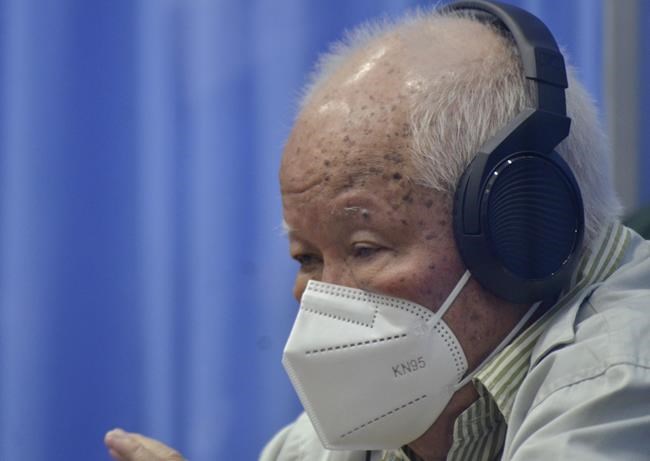Prosecutor: Khmer Rouge defendant guilty of regime’s crimes
Advertisement
Read this article for free:
or
Already have an account? Log in here »
To continue reading, please subscribe:
Monthly Digital Subscription
$0 for the first 4 weeks*
- Enjoy unlimited reading on winnipegfreepress.com
- Read the E-Edition, our digital replica newspaper
- Access News Break, our award-winning app
- Play interactive puzzles
*No charge for 4 weeks then price increases to the regular rate of $19.00 plus GST every four weeks. Offer available to new and qualified returning subscribers only. Cancel any time.
Monthly Digital Subscription
$4.75/week*
- Enjoy unlimited reading on winnipegfreepress.com
- Read the E-Edition, our digital replica newspaper
- Access News Break, our award-winning app
- Play interactive puzzles
*Billed as $19 plus GST every four weeks. Cancel any time.
To continue reading, please subscribe:
Add Free Press access to your Brandon Sun subscription for only an additional
$1 for the first 4 weeks*
*Your next subscription payment will increase by $1.00 and you will be charged $16.99 plus GST for four weeks. After four weeks, your payment will increase to $23.99 plus GST every four weeks.
Read unlimited articles for free today:
or
Already have an account? Log in here »
Hey there, time traveller!
This article was published 18/08/2021 (1544 days ago), so information in it may no longer be current.
PHNOM PENH, Cambodia (AP) — In his position of authority, the former head of the Khmer Rouge shared joint culpability for the regime’s atrocities in Cambodia in the 1970s, prosecutors said Wednesday, rejecting defense arguments that he should not be held responsible.
Khieu Samphan, 90, is appealing his 2018 conviction for genocide, crimes against humanity and war crimes. He is the last surviving member of the inner circle of Pol Pot’s radical communist regime that ruled Cambodia with an iron fist from 1975 to 1979 and was responsible for the deaths of an estimated 1.7 million people.
His defense team has argued there were procedural errors in the original Extraordinary Chambers in the Courts of Cambodia trial and challenged the evidence against him.

In the third day of arguments Wednesday, defense attorney Anta Guissé questioned the use of the principle of joint criminal enterprise in his conviction, under which individuals can be held responsible for the actions of a group to which they belong.
Guissé told the international tribunal the reasoning was hazardous, arguing that it replaces “belonging to a political project” with a “criminal objective and intent” to commit a crime.
The court, she said “had to establish that he intended to commit a crime and that he associated with other persons in order to achieve this objective and, furthermore, that he broadly contributed to the crime.”
“Short of that,” she said, “one cannot say that there was proof, that there was intent, to commit the crimes.”
Khieu Samphan sat behind Guissé as she spoke, wearing earphones to hear the proceedings and a mask as part of the COVID-19 precautions.
Prosecutor William Smith rejected her argument, telling the ECCC’s Supreme Court chamber that precedent from trials of war crimes from the former Yugoslavia had established that it’s not required to show a defendant had knowledge of specific incidents.
“Indeed, it would be artificial, impractical and defeat the purpose of having (joint criminal) liability in the first place to require the precise intent or precise knowledge of each and every crime committed in the course of a large-scale ongoing joint criminal enterprise,” Smith argued. “As long as the appellant intended, or was aware of the general types of crimes being committed pursuant to the common purpose, that is all that is required.”
After being ousted from power in 1979, the Khmer Rouge waged guerrilla warfare for another two decades before disintegrating. Pol Pot died in the jungle in 1998, and on Dec. 24 of that year, Khieu Samphan surrendered along with Nuon Chea, the movement’s chief ideologue.
Nuon Chea was considered Pol Pot’s right-hand man, while Khieu Samphan as head of state presented a moderate veneer as the public face for the highly secretive group.
Nuon Chea was convicted alongside Khieu Samphan in 2018 and died the following year.
The defendant is scheduled to address the tribunal on Thursday, the last day of the four-day hearing on his appeal. A verdict is not expected until next year.
Even if the conviction is overturned, Khieu Samphan is already serving a life sentence after being convicted in 2014 of crimes against humanity connected with forced transfers and disappearances of masses of people. That conviction was upheld on appeal in 2016.
___
Rising reported from Bangkok.

